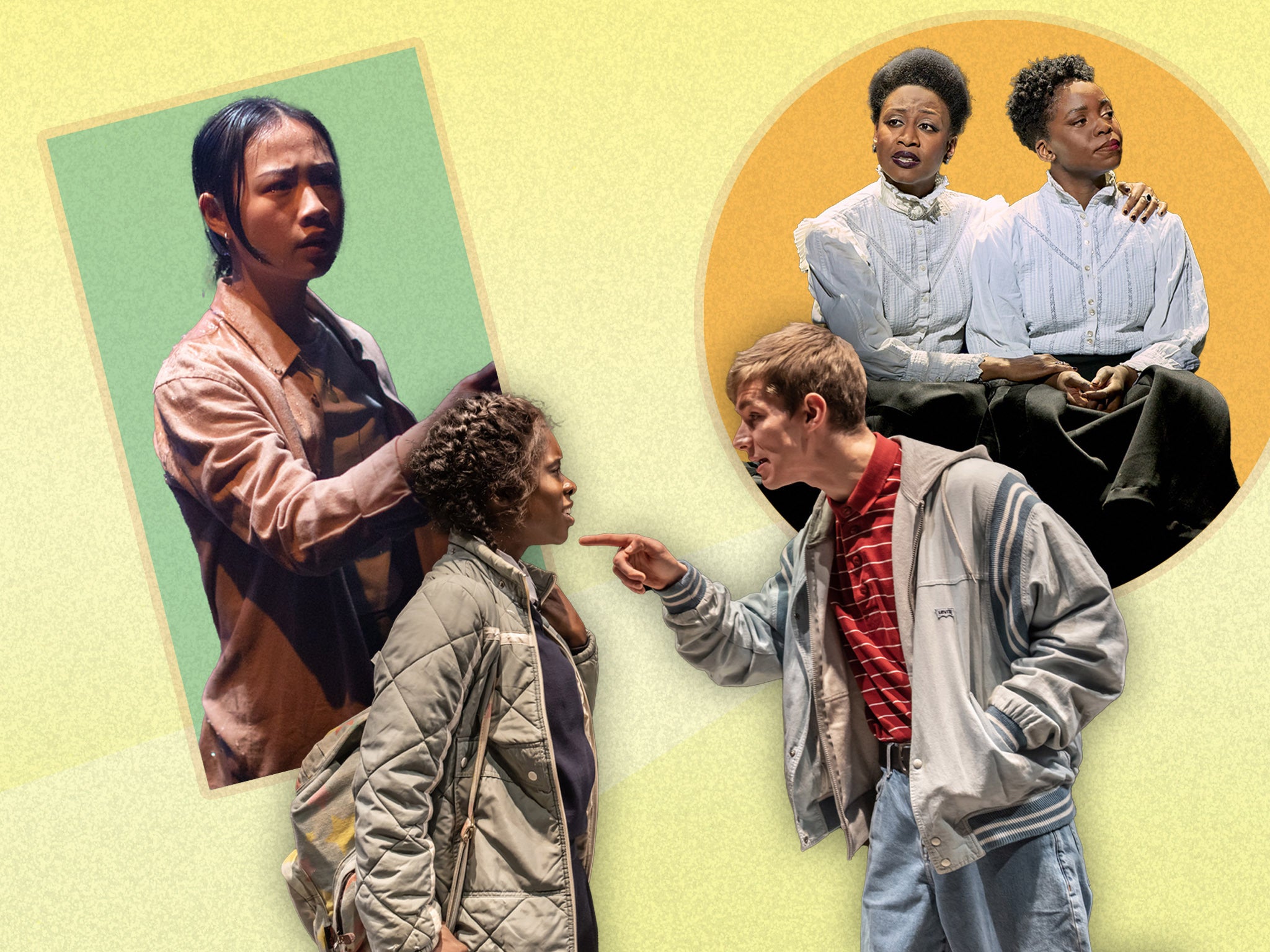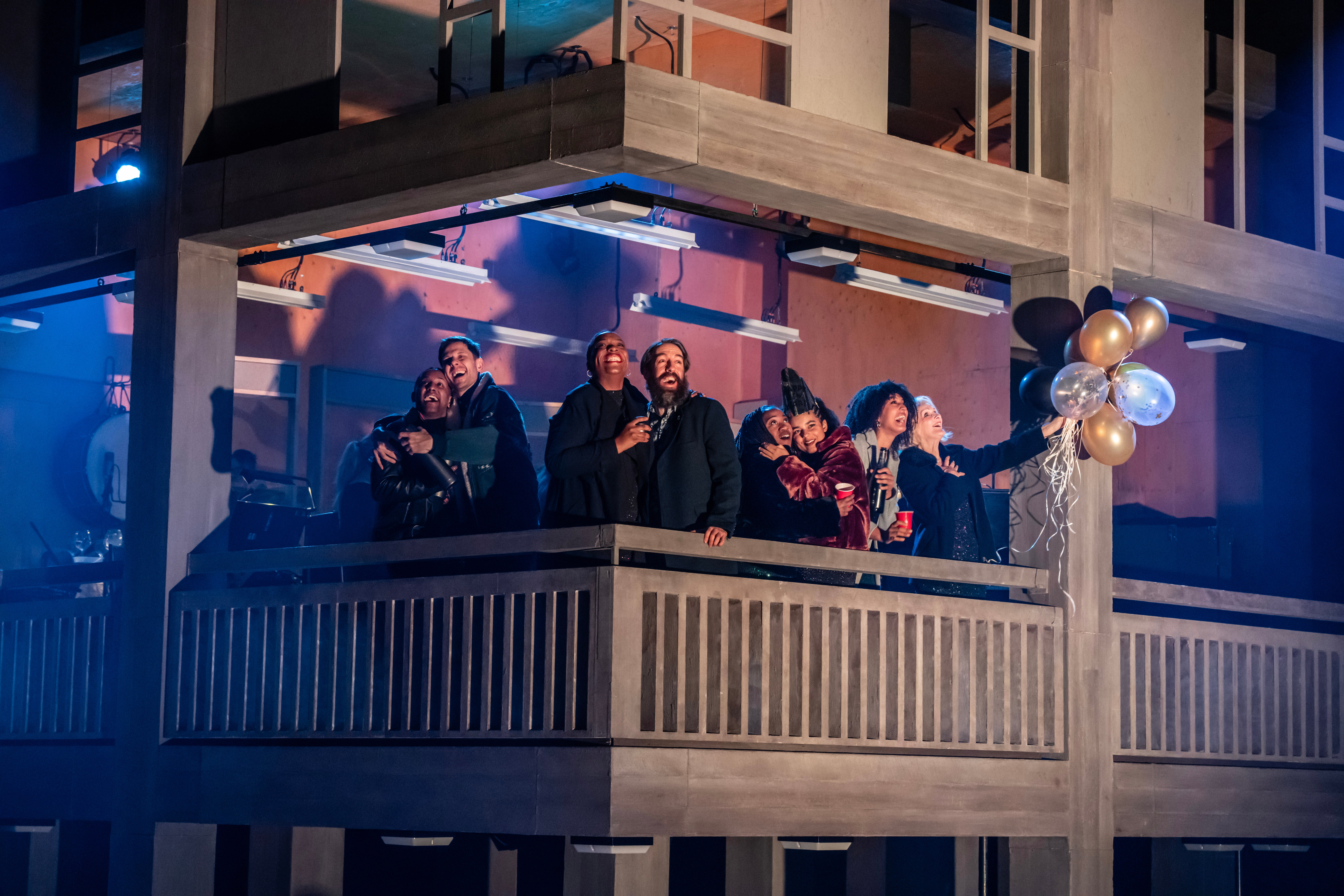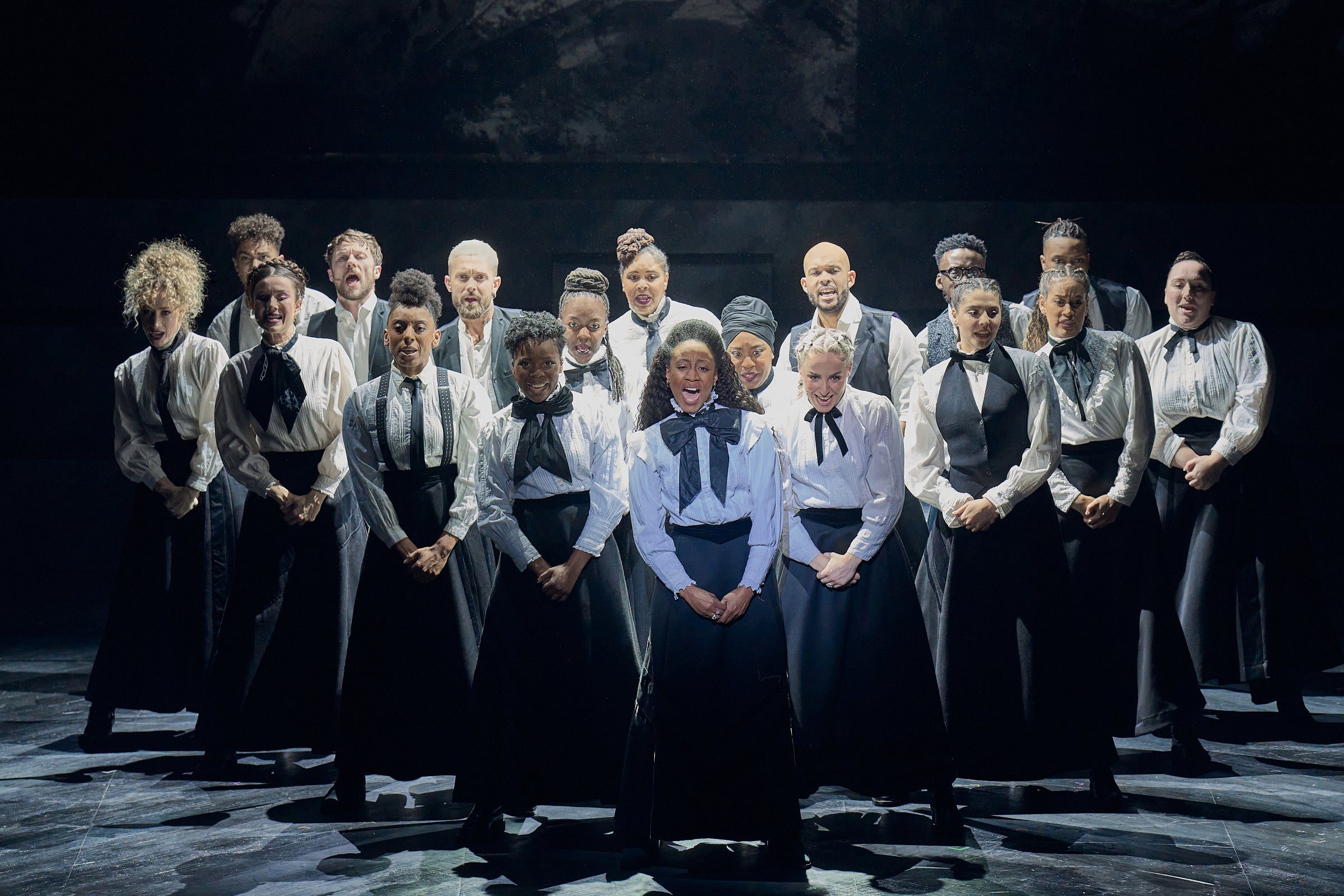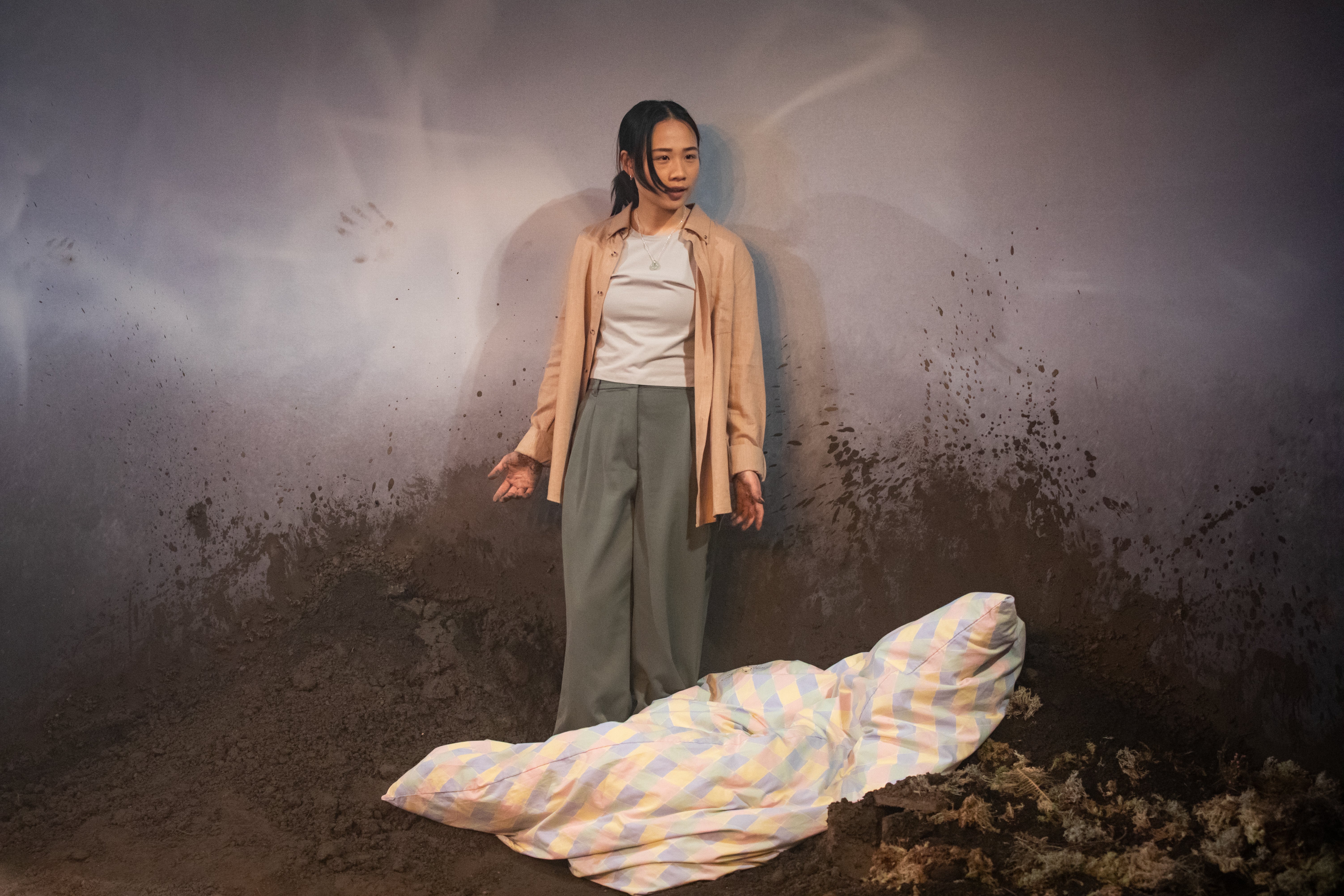The Week on Stage: From Standing at the Sky’s Edge to Sylvia
A guide to the week’s theatre

This week, we have two long-awaited arrivals on the London stage: Richard Hawley’s musical Standing at the Sky’s Edge (which was first shown in Sheffield in 2019) and Sylvia (originally staged at the Old Vic in 2018). Plus, emerging playwright Ava Wong Davies’s Graceland makes its debut in the Jerwood Upstairs at the Royal Court.
Standing at the Sky’s Edge – National Theatre ★★★★☆
Sheffield’s Park Hill estate. A brutalist “local landmark” that people now “come from miles around to chuck themselves off”. But in Richard Hawley and playwright Chris Bush’s musical, this sprawling complex tells the story of not only Sheffield’s history, but Britain’s: from Thatcher to modern-day gentrification. Standing at the Sky’s Edge, a hymn to Sheffield, is joyous, angry and sad. A real tearjerker, rich in pathos, it makes its point without force.
The flat at the centre of the musical is deliberately unremarkable: everything from the furniture to the jars in the fridge is the same uniform grey. It’s the people who bring the colour, as three stories play out in three timelines, initially separate, then overlapping. In 1960, newlyweds Rose (Rachael Wooding) and Harry (Robert Lonsdale) step over the threshold into their new home. In 1989, a refugee family from Liberia, including teenager Joy (a phenomenal Faith Omole), are warned to lock their doors. In 2015, Poppy (Alex Young) migrates from London while her snobbish parents question whether Ocado is even available up North.

Hawley’s music may not seem like the most obvious choice for a musical. Yet its simplicity allows its transposition into both soaring, powerful group numbers and haunting ballads. The ensemble are universally strong and share the duty of leading the songs, with Baker Musaka’s rendition of “Tonight the Streets Are Ours” a stand-out number I’ve struggled to get out of my head since leaving the theatre.
Standing at the Sky’s Edge is a proudly Sheffield show, from its politics to the jokes about Henderson’s Relish. There are moments, particularly in the earliest timeline, where the characters feel a little clichéd, but they are quickly moved away from. In general, this is a show that avoids stereotypes offering an easy “modernisation = bad” argument about the city and its people. It condemns gentrification, yes, but also acknowledges the over-romanticisation of the past and the need to adapt to survive. The words “I love you will u marry me” that float above the stage, once a sincere declaration of love in graffiti form, are now a neon art installation. Some of the authenticity is gone, but the message remains. Isobel Lewis
Sylvia – Old Vic ★★★☆☆
Hip-hop and feminist firebrand Sylvia Pankhurst: it’s an unlikely pairing. In Kate Prince’s hugely ambitious musical, they come together to tell the story of the women’s suffrage movement in early 1900s Britain. Sylvia mixes rap, spoken word, soul music and street dance in its retelling of the journey towards women getting the right to vote. Despite its tough premise, the show has some shining moments – but attempts at creating the UK’s answer to Hamilton are held back by a story that just doesn’t say enough.

Our protagonist Sylvia (Sharon Rose) is the daughter of leading suffragette Emmeline Pankhurst (Beverley Knight) and is a budding activist in the fight for women’s rights. Though she begins as her mother’s protégé, Sylvia ends up breaking away from Emmeline’s cause for one that represents a broad spectrum of women – not just the rich. Rose is a solid lead: bright-eyed and confident, with a soaring singing voice. Meanwhile, Knight is at her best as the formidable matriarch; a second-act battle between Emmeline and Sylvia over their clashing views is electrifying. But no character feels fully fleshed out, meaning that it’s difficult to invest in the tensions between them. We’re left wondering about who these people are outside of their politics, and it’s frustrating to never get an answer.
Perhaps this would be easier to look past if there weren’t so many other bold choices to wrap our heads around. At one point, Winston Churchill’s mother has a Jamaican patois rap solo that is equally unforgettable and baffling. You can’t knock Sylvia for trying something fresh, and it stands as a true showcase of the gifted singers and dancers in the ensemble cast. But in taking such clear inspiration from Lin-Manuel Miranda’s epic production, even down to the cadence of the raps, Sylvia is left a little exposed, and its narrative shortcomings are hard to ignore. Nicole Vassell
Graceland – Royal Court ★★★☆☆
“I don’t believe in love at first sight,” Nina (Sabrina Wu) tells the audience in the opening scene of Graceland. “But it feels like I’m falling. What else would you call that?” Good question. On the surface, Ava Wong Davies’s play is a love story, running the length of Nina’s relationship with a rich boy poet she meets at a party. But beneath, something darker lies. Like that falling feeling, it left my stomach churning.
The story is told by our protagonist, a British-Chinese receptionist, on a concrete slab in the middle of the traverse stage. As soon as the pair meet, an unequal power dynamic (racial, financial, gendered) emerges. But Nina feels like his equal, teasing him with the question: “How can someone be a poet?”, dripping in sarcasm.

Wong Davies’s script is romantic and lyrical, initially hobbling itself with lengthy metaphors about love that sound more like an extract from a novel than a play. Yet Graceland gains focus as the relationship unfolds and the signs of emotional abuse begin to emerge. Nina’s boyfriend jokes to friends that she’s a messy drunk, but then she falls in a pond, so it’s true, right? He tells her to quit her job and rely on him financially; she has no passion, so why not?
Wu shines when that icky feeling sets in, conjuring the ominous second character – who never appears – in looks of love and fear alone. He is cold one minute, dramatic the next. As the relationship becomes more volatile, so Nina becomes more animated, invigorated by a desire to please him. Still, Nina never names what is happening to her. When she recalls a scene where he stealths her (a form of sexual assault in which a condom is removed without consent), she refuses to use those words to define it.
Throughout the show, Wu leaves the stage and sinks herself into the piles of dirt surrounding the raised block, descending to his level. As metaphors go, it’s obvious yet impactful. When she returns, she presses dirt into the floor with the soles of her feet. Wong Davies’s message is clear: abuse damages everything, whether we call it that or not. IL
Join our commenting forum
Join thought-provoking conversations, follow other Independent readers and see their replies
Comments


Bookmark popover
Removed from bookmarks